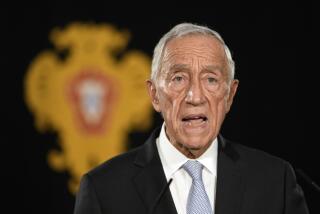Tunisia on verge of new crisis over regime holdovers
- Share via
Reporting from Tunis, Tunisia — As Tunisia’s top general warned that the country’s revolution “risks being lost,” the fragile transitional government was on the verge of a fresh crisis Monday over an issue that has dogged it from the start: the inclusion of politicians associated with the regime ousted this month.
Political insiders and media reports said changes in the interim government of Prime Minister Mohamed Ghannouchi were imminent, and officials were in talks late into the night. Ghannouchi held the same post under President Zine el Abidine ben Ali, who was driven from power after weeks of street protests.
Some news agencies quoted anonymous sources as saying a committee of “wise men” would replace the interim government until elections are held. But a government spokesman said the Cabinet was discussing how to fill vacant positions in the government, according to the official news agency Tunis Afrique Presse.
The continued conflict led the popular army chief to warn Monday that the nation was in danger of backsliding into dictatorship.
“Our revolution, your revolution, the revolution of the young, risks being lost,” Gen. Rachid Ammar told protesters in downtown Tunis, Agence France-Presse and local media reported. “There are forces that are calling for a void, a power vacuum. The void brings terror, which brings dictatorship.”
Ammar’s word carries tremendous weight. His refusal to allow troops to open fire on demonstrators tipped the balance against Ben Ali, who fled for Saudi Arabia on Jan. 14, paving the way for what may eventually become an Arab world experiment in democratic rule. Elections are planned in six months.
Abid Briki, deputy chief of the powerful General Union of Tunisian Workers, or UGTT, predicted that any Cabinet reshuffle would fall short of expectations. “Know that the UGTT does not want a reshuffling of the Cabinet but a total reconstitution of the government,” he told The Times.
Days of protests against the interim government led by Ghannouchi and President Fouad Mebazaa appeared to be gathering momentum.
Clashes between stone-throwing protesters and security forces erupted Monday outside the prime minister’s office in the capital’s ancient Casbah, where police fired tear gas at demonstrators. Teachers who were scheduled to begin classes during the day instead staged a strike and gathered in front of the Interior Ministry, demanding the abolition of the interim government.
The UGTT, which also played an important role in the uprising, appears to be behind at least some of the labor unrest. It first joined and then quit the interim government and now is lobbying against it. Hundreds gathered in front of its downtown headquarters Monday, apparently awaiting instructions. A procession of domestic workers and gardeners associated with the union marched through the streets, demanding better labor conditions.
One former official wondered why the interim government was risking so much by retaining former members of Ben Ali’s Constitutional Democratic Rally, or RCD, including Ghannouchi and Mebazaa.
“We do not know why these ministers are in the government,” said Abdejelil Bedoui, who served as secretary to the prime minister in a previous government. “The government will probably purge the RCD because the street wants their departure in order to create a government of independence and democracy.”
Special correspondent Sihem Hassaini contributed to this report.
More to Read
Sign up for Essential California
The most important California stories and recommendations in your inbox every morning.
You may occasionally receive promotional content from the Los Angeles Times.













